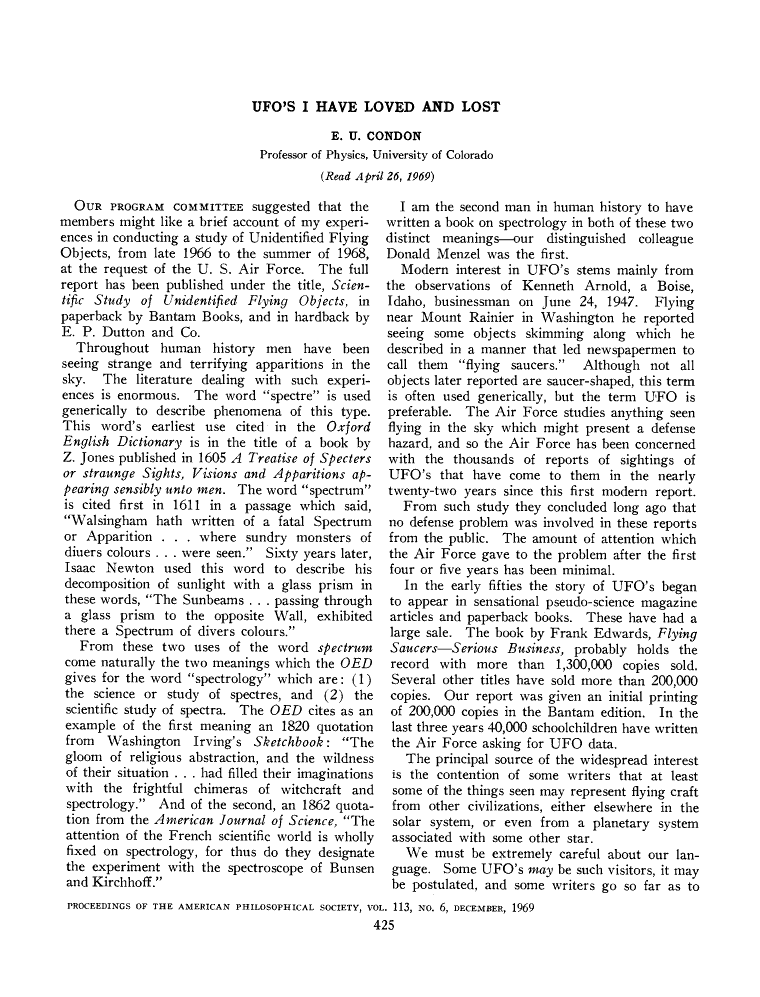Condon, Edward U. : Proceedings of the American Philosophical Society, Vol. 113, n� 6, pp. 425-427,
: Proceedings of the American Philosophical Society, Vol. 113, n� 6, pp. 425-427,
 : Proceedings of the American Philosophical Society, Vol. 113, n� 6, pp. 425-427,
: Proceedings of the American Philosophical Society, Vol. 113, n� 6, pp. 425-427, 
Our program committee suggested that the members might like a brief account of my expriences in conducting a study of Unidentified Flying Objects, from late 1966 to the summer of 1968, at the request of the U.S. Air Force. The full report has been published under the title, Scientific Study of Unidentified Flying Objects, in paperback by Bantam Books, and in hardback E. P. Dutton & Co.
Throughout human history men have been seeing strange and terrifying apparitions in the sky. The litterature dealing with such experiences is enormous. The word "spectre" is used generically to describe phenomena of this type. This word's earliest use cited in the Oxford English Dictionary is in the title of a book by Z. Jones published in 1605 A Treatise of Specters or straunge Sights, Visions and Apparitions appearing sensibly unto men. The word "spectrum" is cited first in 1611 in a passage which said, "Walsingham hath written of a fatal Spectrum or Apparition . . . where sundry monsters of diuers colours . . . were seen." Sixty years later, Isaac Newton used this word to describe his decomposition of sunlight with a glass prism in these words, "The Sunbeams . . . passing through a glass prism to the opposite. Wall, exhibited there a Spectrum of divers colours."
From these two uses of the word spectrum come naturally the two meanings which the OED gives for the word "spectrology" which are: (1) the science or study of spectres, and (2) the scientific study of spectra. The OED cites as an example of the first meaning an 1820 quotation from Washington Irving's Sketchbook: "The gloom of religious abstraction, and the wildness of their situation . . . had filled their imaginations with the frightful chimeras of witchcraft and spectrology." And of the second, and 1862 quotation from the American Journal of Science, "The attention of the French scientific world is wholly fixed on spectrology, for thus do they designate the experiment, with the spectroscope of Bunsen and Kirchhoff."
I am the second man in human history to have written a book on spectrology in both of these two distinct meanings—our distinguished colleague Donald Menzel was the first.
Modern interest in UFO's stems mainly from the observations of Kenneth Arnold, a Boise, Idaho, businessman on June 24, 1947. Flying near Mount Rainier in Washington he reported seeing some objects skimming along which he described in a manner that led newspapermen to call them "flying saucers." Although not all objects later reported are saucer-shaped, this term is often used generically, but the term UFO is preferable. The Air Force studies anything seen flying in the sky which might present a defense hazard, and so the Air Force has been concerned with the thousands of reports of sightings of UFO's that have come to them in the nearly twenty-two years since this first modern report.
From such study they concluded long ago that no defense problem was involved in these reports from the public. The amount of attention which the Air Force gave to the problem after the first four or five years has been minimal.
In the early fifties the story of UFO's began to appear in sensational pseudo-science magazine articles and paperback books. These have had a large scale. The book by Frank Edwards, Flying Saucers—Serious Business, probably holds the record with more than 1,300,000 copies sold. Several other titles have sold more than 200,000 copies. Our report was given an initial printing of 200,000 copies in the Bantam edition. In the last three years 40,000 schoolchildren have written the Air Force asking for UFO data.
The principal source of the widespread interest is the contention of some writers that at least some of the things seen may represent flying craft from other civilizations, either elsewhere in the solar system, or even from a planetary system associated with some other star.
We must be extremely careful about our language. Some UFO's may be such visitors, it may be postulated, and some writers go so far as to ...